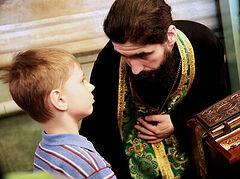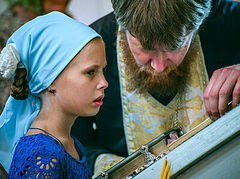“To what extent do sinful thoughts differ from sins actually committed? I don’t do anything wrong, but sometimes I have some kind of aggression inside me. That’s why it’s scary for me to go to confession. And in general, with what sin is it not even worth going to confession, or coming close to the church?” Archpriest Victor Potapov of the St. John the Baptist Cathedral, Washington, DC answers this important question in the July issue of Parish Life.
There is no such sin in nature. In the Gospel, Peter asked: “Lord! How oft shall my brother sin against me, and I forgive him? Till seven times?” Christ answered: “Until seventy times seven” (Matt. 18:21–22), that is, as many times as they ask for forgiveness. Elsewhere it is said that “All manner of sin and blasphemy will be forgiven unto men, but blasphemy against the Holy Spirit shall not be forgiven unto men,” (Matt. 12:31)—that is, in practice there is but one [unforgiveable] sin.
But what is behind this question? It is distrust in God. When a person takes such a position, it means that a tragedy has already occurred within him: At some point, he has ceased to trust in God’s mercy, he has ceased to believe that God’s love is far above anything we can all accomplish together. The question to be posed is not “With what sin can one not go to Confession?” We should ask, “What kind of heart cannot go [to Confesion]? If the heart is repentant, if it trusts in God, if it seeks Him, there is nothing with power over us that that would not lose it. But if one’s heart is awash in selfishness, in egocentrism, perhaps there is no need to even go to Confession, for one is no longer going to God, but to oneself, trying to get away from oneself but turning to oneself.
As for thoughts, except in the case of particularly holy people, they come to everyone's mind. While it is written in the Patericons that most of humanity will be attacked by evil desires and thoughts until the end of life, that is not what is important here. What matters is whether I accepted those thoughts and desires. In short, the thought that I did not accept as a norm, as a cause for permissible action, should not be attributed to me; I should forget about it as soon as possible. If I have already agreed with the thought, regardless of whether it has been put into concrete human action, the sin has already occurred, for the heart has been poisoned, and according to the Lord, it is from the heart that everything comes. Outward physical action is the expression of what has already taken place within. All the more so because other sins, e.g. vanity—the fear of others judging you, of thinking less of you—can limit the outward manifestation of a given sin.
Fr. Victor invites his readers to send their questions regarding the Church and spiritual life to vpotapov@comcast.net or by conventional mail addressed to our church at: 4001 17th St. NW, Washington, DC 20011. He will try to answer those questions in a future issue of Parish Life.




